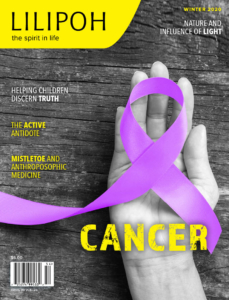Editor’s Note by Christy Korrow
 Welcome to the first LILIPOH issue of 2020,
Welcome to the first LILIPOH issue of 2020,
Looking ahead in the new year, here are some goals for LILIPOH 2020:
More inclusion and diversity in our pages, more Spanish language translations of our articles, more youth authors, and more stories of working with purpose and out of a commitment to benefit others.
Please share these goals with your friends who might like to help make them a reality and send your ideas to editor@lilipoh.com.
The goals above speak to the deep need for us to stand up to the injustice and oppression of those who are discriminated against because of their race, ethnicity, country of origin, sexual identity or orientation, religion, or ability. As a rise in hate crimes, anti-immigrant policies, and white nationalism is sweeping through our country, I have reflected on the relevance of this quotation from Rudolf Steiner (GA 191; October, 1919):
“A passion, a violent eruption of nationalism has come upon humankind, and that is as damaging to the social life on earth as is materialism for the life of thinking. So, in the same way that humanity is to work itself out of materialism in order to reach freedom and life in the spirit, it must work itself out of all nationalism, in any form, towards universal humanity. Without that, there can be no progress.”
Progress in this sense does not mean being neutral and standing by silently. It requires us to actively work toward the tolerance on which our diverse democracy depends.
I invite you to read and reflect on Article 1 from the UNESCO Declaration of Principles on Tolerance as you embark into this new decade.
Christy Korrow
Article 1 - Meaning of tolerance
1.1 Tolerance is respect, acceptance and appreciation of the rich diversity of our world's cultures, our forms of expression and ways of being human. It is fostered by knowledge, openness, communication, and freedom of thought, conscience and belief. Tolerance is harmony in difference. It is not only a moral duty, it is also a political and legal requirement. Tolerance, the virtue that makes peace possible, contributes to the replacement of the culture of war by a culture of peace.
1.2 Tolerance is not concession, condescension or indulgence. Tolerance is, above all, an active attitude prompted by recognition of the universal human rights and fundamental freedoms of others. In no circumstance can it be used to justify infringements of these fundamental values. Tolerance is to be exercised by individuals, groups and States.
1.3 Tolerance is the responsibility that upholds human rights, pluralism (including cultural pluralism), democracy and the rule of law. It involves the rejection of dogmatism and absolutism and affirms the standards set out in international human rights instruments.
1.4 Consistent with respect for human rights, the practice of tolerance does not mean toleration of social injustice or the abandonment or weakening of one's convictions. It means that one is free to adhere to one's own convictions and accepts that others adhere to theirs. It means accepting the fact that human beings, naturally diverse in their appearance, situation, speech, behaviour and values, have the right to live in peace and to be as they are. It also means that one’s views are not to be imposed on others.
